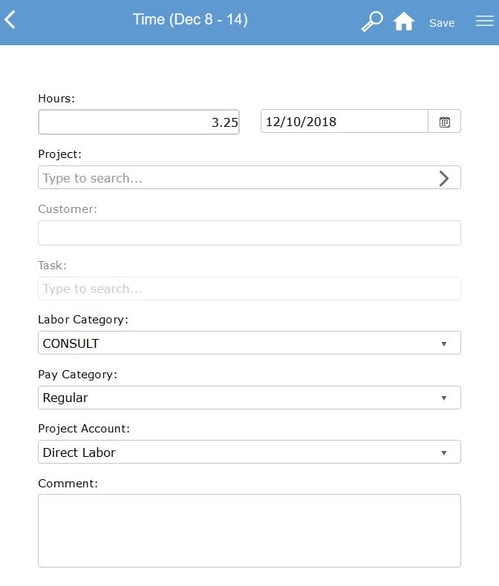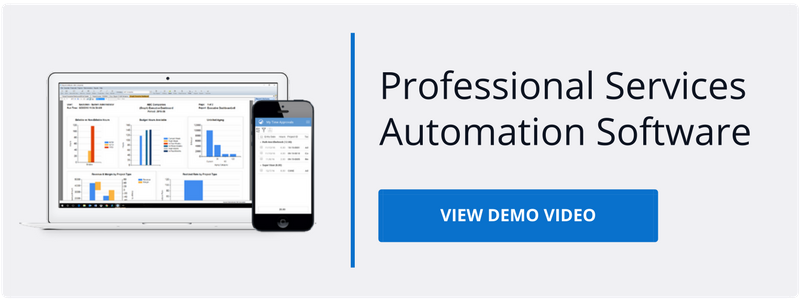Of the many reasons why projects fail, wasted or lost time is often near the top of the list. Recent reports indicate that, in today's busy industrial world, losses caused by lost or wasted time are the norm, not the exception. If you want to improve the success and profitability of your professional services business, one tactic you should consider is to gain more control over its use of - and billing for - time.
The Scourge of Wasted Time
One would think that most corporate heads are fastidious about time tracking, for themselves initially but also for those workers whose billable hours are the life-blood of their company. However, recent reports reflect that, not only is that not the case, but instead, both business owners and professional services providers waste an inordinate amount of time each week and lose the potential revenues hidden in those lost hours. Further, these losses occur even when the worker has the tools and incentive to do better.
A Harvard Business Review survey revealed that the average American professional worked an average of 72 hours per week. A Gallup/Wells Fargo poll found that 57 percent of small business owners work six days a week and 20 percent of those work seven days a week. Increasingly, the 40-hour work week is no longer the norm:
- Much of the increased 'work time' is attributable to smartphone use and 24/7 access to the office through other occupation-related technology. Most respondents didn't mind the connectedness to their offices (they believed it helped them do better work), but they did resent how much time they wasted on non-productive activities such as trying to make sense of disorganization and ineffectiveness.
- "Too many meetings" is often the response given when asked about what was the biggest time drain. One large company reportedly lost 300,000 work hours in one year 'in support' of executive committee meetings. Not only were those workers required to sit through the meetings, but they also spent an enormous amount of time preparing the materials needed to 'support' the gathering.
- Lower level professionals get irritated when their bosses interrupt their workday with trivial or unnecessary chores which then require them to make up the lost time at home or on the weekend.
For Service Professionals, Lost Time can Doom a Project or Close a Business
One element that sets service professionals apart from other contractors is that, in most cases, they are paid solely on the time they invest in any given project or service rather than the number of widgets they produce.
 The Beyond Software mobile app makes it easy for employees to capture the full billable value of every working hour.
The Beyond Software mobile app makes it easy for employees to capture the full billable value of every working hour.
Their 'billable hourly' rate reflects the high value of their services as that has evolved from their education, experience, and industry insights, and their application of those assets to the customer's project on an hourly basis is the very service for which the client is paying.
Capturing the full billable value of every available working hour is critical to the success of most professional services businesses; for them, time really does equal money.
However, studies reveal that even accounting professionals aren't good at tracking their billable time, nor are practitioners in other professions:
CPAs and Lost Time
Like other professionals, CPAs struggle to track their billable hours while managing non-billable distractions. Sometimes those distractions are necessary; administrative tasks, HR concerns and other business-related issues must be dealt with. Other times, however, CPAs lose valuable billable time by retracing steps they should have managed in the first place, such as correcting erroneous spreadsheets or readdressing a critical review comment that was missed the first time through the document.
In a survey of billing service professionals, which included CPAs, respondents reported capturing just 67 percent of their legitimate billable time. When extrapolated out, that figure indicates that they could earn another $100,000 per year if they are already billing out $200,000.
Lawyers and Lost Time
Lawyers bring more than just knowledge of the law to their clients; they also provide strategy, direction, and oversight to both the case and the client's business. However, capturing every nuance of legal input into every case can be challenging as most lawyers often juggle the needs of several clients at the same time. Consequently, while they may spend enormous amounts of time working for their clients, they often don't put that same level of attention into capturing that value on a billable basis.
In fact, according to one researcher, attorneys can lose up to six hours of billable time per day chasing practice and case minutia. Further, three out of four lawyers report working outside of business hours just to make up the billable time they lost while in the office. Neither of these circumstances demonstrates best practices and far too many attorneys remain trapped in these behaviors, losing time that could be captured and monetized.
Three out of four lawyers report working outside of business hours just to make up the billable time they lost while in the office.
Architects and Lost Time
For the architect, managing billable time is possibly even more challenging than it is for lawyers and CPAs. Although they are often the lead participant in their projects, architects are usually a member of a larger team, which can include owners, contractors, tradespeople, and even government agents. All those contributors can steer the professional's attention away from their focused work, a fact made clear by a recent study on time loss on construction sites.
In the study, researchers looked for discernable reasons why construction projects often fail to come in on time, and their conclusions are revealing:
- Document mismanagement played a significant time-wasting role as project participants struggled to find misplaced papers, interpret ambiguities, and clarify the inconsistencies found in relevant project documents.
- Congested or inaccurate information flow was also a time-wasting inhibitor of project progress. Not only was it a challenge to follow along with project documents and drawings, but incoming communications from participant conversations and data from the field also complicated the communications process.
- Not surprisingly, people managed to impede their own progress; the more people involved in the decision-making process, the longer it took and the more time it wasted.
While it's true that architects are not responsible for how other project participants manage their time, they are often held accountable for delayed project completion. Capturing their billable time under these and other challenging conditions is understandably difficult.
Time-Tracking Best Practices
Obviously, the response to all these challenges is to be better at time-keeping, which, if it were easy to do, would have already been mastered by these professionals early in their careers. However, while there are some time-keeping best practices that will benefit all professional services providers, today’s advanced technologies also offer a tool that might just solve the billable-time-management concern once and for all.
1. Prioritize it
If the professional isn't prioritizing capturing their valuable time, why should their client prioritize paying for it? The problem for most professionals is that they address their time tracking and reconciliations activities on a weekly or monthly (!) basis, which often fails to account for all appropriately billed time in the interim. Professional services accounting should be performed daily, if not as the work is done.
2. Use Billed-Hour Data Wisely
While most professionals use their billable hours to substantiate their monthly invoice, that data can also be used to gain insights into practice metrics. Clarifying which clients provide the best returns (and which don't) can help steer the business toward a more lucrative future.
3. Use Professional Services Automation (PSA) Software
Early versions of professional services software were often just digital versions of paper tools. Beyond Software's automated time-tracking software finally eliminates those outdated time-tracking methods and offers professionals in every industry the opportunity to automatically capture billable time as well as time entered on a project basis.
- Automation eliminates the need for intentional entry of all but the most specific time-management elements. Data entered in one field is automatically entered into all other relevant fields, which speeds communication and decision-making opportunities.
- Meetings run smoother because all attendees have the same data in front of them, the software keeps the agenda in place, and adding actionable take-aways lets participants leave knowing exactly what their next steps will be.
- Beyond's software also tracks to-do lists, including deadlines, incremental steps, and collaboration efforts.
- The software reduces the time spent on the worst time-consumer: administrative tasks. Beyond's intuitive dashboard lets management look at each ongoing project individually, as well as oversee the progress of the enterprise as a whole. This level of granular data keeps leadership informed about the progress of all workers, tracks communications across teams and projects, and keeps administrative details recorded and in order for future reference.
- Beyond's PSA software offers its users 24/7 access to cutting-edge digital tools that are always current with trends and accessible to every authorized worker. Beyond provides the highest levels of security standards, including automatic backups and redundant instances in secure data centers. Further, by managing the technical end of its PSA software, Beyond eliminates 'tech management' as an administrative chore, too.
Professionals provide invaluable and irreplaceable services for their clients and deserve to be compensated for that high value. Automated professional services software from Beyond Software offers an equally valuable tool to every professional to help them track their time, their administrative requirements and the progress of their enterprise.
Don't wait for a billing disaster to way-lay your professional services organization; contact Beyond Software today to get started with specialized PSA software for your professional services enterprise.
For additional information on Beyond Software please contact:
Nicole Holliday
nholliday@beyondsoftware.com
866-510-7839


